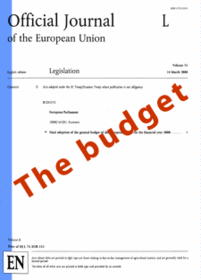Budget

- Official Journal of the European Union (Photo: www.ec.europa.eu/budget)
The budget is drafted by the EU Commission and then decided by the Council and the EU Parliament. The ministers in the Council have the last word on so-called compulsory expenditures or obligatory spending, which is mainly spent on the agricultural budget.
The EU Parliament has the last word on non-obligatory or non-compulsory expenditures, covering most other purposes.
There have been several battles on the classification of expenditures, with the result that the EU Parliament has acquired more powers over the years. Non-obligatory spending has been increased from 8% of the budget in the seventies to 58% in 2003. The classification is now decided by inter-institutional agreement.
The income side of the budget is decided solely by the Council through customs duties, agricultural levels, fines, 1% of the VAT base plus a GNP-related contribution.
There is a ceiling on total EU income (own resources) which must be below 1.27 % of the total GNP. The budget can only go beyond 1.27 % by unanimous agreement among Member States.
The future
The EU Constitution proposes to abolish the distinction between compulsory and non-compulsory spending and to give the EU Parliament the last word on spending and the Council the last word on EU income and its sources.
Links
http://europa.eu.int/pol/financ/index_en.htm
See also pdf file on Budget, budgetary control and fraud:
http://www.euabc.com/upload/pdf/budget.pdf

